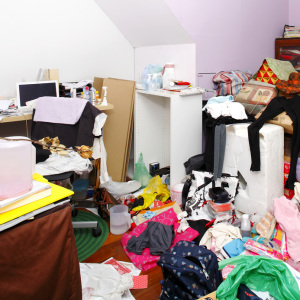
Several of the providers at Psych Choices of the Delaware Valley have been trained in the treatment of hoarding disorder and related conditions.
If you are concerned about your own or a loved one's collecting, compulsive shopping, cluttering, or hoarding, you are not alone. Please reach out for help.
As many as 1 in 20 Americans have serious problems with hoarding. Still others have trouble with compulsively buying things they do not need or even want, while others are chronically disorganized and may have difficulty with daily tasks because of their inability to keep track of notes, documents, bills, or possessions.
Hoarding becomes a "disorder" when it prevents normal use of living space, causes significant distress to the hoarder and/or family members, and has a negative impact on health and safety.
People may hoard food (long past its expiration date), clothing, packaging materials, or animals, even when the number of animals makes it impossible for the animals themselves to stay healthy. Hoarders may become isolated, when family and friends begin to avoid visiting them. Homes may become unsanitary or dangerous because of blocked exits or falling objects. Often, the person who is hoarding becomes depressed, and yet seems to be unable to part with their "collection" or even to admit it has become a problem.
Treatment for hoarding, compulsive shopping, and chronic disorganization is available, but a complete "cure" can be hard to find. Often, what we can best hope for is to create safer and more sanitary conditions, in order to reduce harm to the person and their family.
What we know doesn't work is a forced cleanup. It will be far more effective and safer to gradually help the person to agree to the need for change. If they are forced to clear out clutter, or someone does it without their permission, they may become extremely upset and refuse further help. And the hoarding is likely to begin all over again.
A psychotherapist can help guide the individual and family members to take gradual steps to reduce clutter. The therapist will usually take a very practical approach to changing behavior, and try to help the person begin to challenge their own thinking patterns. They will help the person set small goals and accomplish them one by one.
Psychiatrists can also prescribe medication that may help with the depression, anxiety, and obsessive-compulsive symptoms that are typically associated with this condition.
Often, a professional organizer can visit the home and provide one on one support as the hoarder begins to organize and part with possessions. There are also support groups and 12-step programs for those with hoarding, cluttering, and compulsive shopping problems.
Online resources:
- http://hoarding.iocdf.org/hoarding/
- http://theshulmancenter.com/
- http://psychcentral.com/lib/10-things-you-should-know-about-compulsive-hoarding/0006787
Books about hoarding:
- Stuff: Compulsive Hoarding and The Meaning of Things by Randy O. Frost and Gail Steketee
- Cluttered Lives, Empty Souls: Compulsive Stealing, Spending and Hoarding by Terrence Shulman




